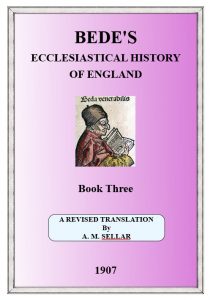- Bede's Eccl. History 1
- Bede's Eccl. History 2
- Bede's Eccl. History 3
- Bede's Eccl. History 4
- Bede's Eccl. History 5
 THE English version of the “Ecclesiastical History” in the following pages is a revision of the translation of Dr. Giles, which is itself a revision of the earlier rendering of Stevens. In the present edition very considerable alterations have been made, but the work of Dr. Giles remains the basis of the translation. The Latin text used throughout is Mr. Plummer’s. Since the edition of Dr. Giles appeared in 1842, so much fresh work on the subject has been done, and recent research has brought so many new facts to light, that it has been found necessary to rewrite the notes almost entirely, and to add a new introduction. After the appearance of Mr. Plummer’s edition of the Historical Works of Bede, it might seem superfluous, for the present at least, to write any notes at all on the “Ecclesiastical History.” The present volume, however, is intended to fulfil a different and much humbler function. There has been no attempt at any original work, and no new theories are advanced. The object of the book is merely to present in a short and convenient form the substance of the views held by trustworthy authorities, and it is hoped that it may be found useful by those students who have either no time or no inclination to deal with more important works.
THE English version of the “Ecclesiastical History” in the following pages is a revision of the translation of Dr. Giles, which is itself a revision of the earlier rendering of Stevens. In the present edition very considerable alterations have been made, but the work of Dr. Giles remains the basis of the translation. The Latin text used throughout is Mr. Plummer’s. Since the edition of Dr. Giles appeared in 1842, so much fresh work on the subject has been done, and recent research has brought so many new facts to light, that it has been found necessary to rewrite the notes almost entirely, and to add a new introduction. After the appearance of Mr. Plummer’s edition of the Historical Works of Bede, it might seem superfluous, for the present at least, to write any notes at all on the “Ecclesiastical History.” The present volume, however, is intended to fulfil a different and much humbler function. There has been no attempt at any original work, and no new theories are advanced. The object of the book is merely to present in a short and convenient form the substance of the views held by trustworthy authorities, and it is hoped that it may be found useful by those students who have either no time or no inclination to deal with more important works.
Among the books of which most use has been made, are Mr. Plummer’s edition of the Ecclesiastical History, Messrs’ Mayor and Lumby’s edition of Books III and IV, Dr. Bright’s “Early English Church History,” and Dr. Hunt’s “History of the English Church from its foundation to the Norman Conquest.” Many of the articles in the “Dictionary of Christian Biography ” and the “Dictionary of Christian Antiquities,” Dr. Mason’s “Mission of St. Augustine,” Dr. Rhys’s “Celtic Britain,” and a number of other books, mentioned in the notes, have been consulted.
For help received in different ways I wish to express my gratitude to various correspondents and friends. I am particularly indebted to Mr. Edward Bell, who has kindly revised my proofs and made many valuable suggestions. For information on certain points I have to thank the Rev. Charles Plummer, Fellow of Corpus Christi College, Oxford, Professor Lindsay of St. Andrews University, Miss Wordsworth, Principal, and Miss Lodge, Vice-Principal of Lady Margaret Hall, Oxford; and in a very special sense I wish to acknowledge my obligations to Miss Paterson, Assistant Librarian at the University Library, St. Andrews, whose unfailing kindness in verifying references, and supplying me with books, has greatly lightened my labours.
 AT this time, that is, in the year of our Lord 605, the blessed Pope Gregory, after having most gloriously governed the Roman Apostolic see thirteen years, six months, and ten days, died, and was translated to an eternal abode in the kingdom of Heaven. Of whom, seeing that by his zeal he converted our nation, the English, from the power of Satan to the faith of Christ, it behoves us to discourse more at large in our Ecclesiastical History, for we may rightly, nay, we must, call him our apostle; because, as soon as he began to wield the pontifical power over all the world, and was placed over the Churches long before converted to the true faith, he made our nation, till then enslaved to idols, the Church of Christ, so that concerning him we may use those words of the Apostle; “if he be not an apostle to others, yet doubtless he is to us; for the seal of his apostleship are we in the Lord.”
AT this time, that is, in the year of our Lord 605, the blessed Pope Gregory, after having most gloriously governed the Roman Apostolic see thirteen years, six months, and ten days, died, and was translated to an eternal abode in the kingdom of Heaven. Of whom, seeing that by his zeal he converted our nation, the English, from the power of Satan to the faith of Christ, it behoves us to discourse more at large in our Ecclesiastical History, for we may rightly, nay, we must, call him our apostle; because, as soon as he began to wield the pontifical power over all the world, and was placed over the Churches long before converted to the true faith, he made our nation, till then enslaved to idols, the Church of Christ, so that concerning him we may use those words of the Apostle; “if he be not an apostle to others, yet doubtless he is to us; for the seal of his apostleship are we in the Lord.”
 EDWIN being slain in battle, the kingdom of the Deiri, to which province his family belonged, and where he first began to reign, passed to Osric, the son of his uncle Aelfric, who, through the preaching of Paulinus, had also received the mysteries of the faith. But the kingdom of the Bernicians—for into these two provinces the nation of the Northumbrians was formerly divided —passed to Eanfrid, the son of Ethelfrid, who derived his origin from the royal family of that province. For all the time that Edwin reigned, the sons of the aforesaid Ethelfrid, who had reigned before him, with many of the younger nobility, lived in banishment among the Scots or Picts, and were there instructed according to the doctrine of the Scots, and were renewed with the grace of Baptism. Upon the death of the king, their enemy, they were allowed to return home, and the aforesaid Eanfrid, as the eldest of them, became king of the Bernicians. Both those kings, as soon as they obtained the government of their earthly kingdoms, abjured and betrayed the mysteries of the heavenly kingdom to which they had been admitted, and again delivered themselves up to defilement and perdition through the abominations of their former idolatry.
EDWIN being slain in battle, the kingdom of the Deiri, to which province his family belonged, and where he first began to reign, passed to Osric, the son of his uncle Aelfric, who, through the preaching of Paulinus, had also received the mysteries of the faith. But the kingdom of the Bernicians—for into these two provinces the nation of the Northumbrians was formerly divided —passed to Eanfrid, the son of Ethelfrid, who derived his origin from the royal family of that province. For all the time that Edwin reigned, the sons of the aforesaid Ethelfrid, who had reigned before him, with many of the younger nobility, lived in banishment among the Scots or Picts, and were there instructed according to the doctrine of the Scots, and were renewed with the grace of Baptism. Upon the death of the king, their enemy, they were allowed to return home, and the aforesaid Eanfrid, as the eldest of them, became king of the Bernicians. Both those kings, as soon as they obtained the government of their earthly kingdoms, abjured and betrayed the mysteries of the heavenly kingdom to which they had been admitted, and again delivered themselves up to defilement and perdition through the abominations of their former idolatry.
But soon after, the king of the Britons, Caedwalla, the unrighteous instrument of rightful vengeance, slew them both. First, in the following summer, he put Osric to death; for, being rashly besieged by him in the municipal town, he sallied out on a sudden with all his forces, took him by surprise, and destroyed him and all his army. Then,when he had occupied the provinces of the Northumbrians for a whole year,not ruling them like a victorious king, but ravaging them like a furious tyrant, he at length put an end to Eanfrid, in like manner, when he unadvisedly came to him with only twelve chosen soldiers, to sue for peace. To this day, that year is looked upon as ill-omened, and hateful to all good men; as well on account of the apostacy of the English kings, who had renounced the mysteries of the faith, as of the outrageous tyranny of the British king. Hence it has been generally agreed, in reckoning the dates of the kings, to abolish the memory of those faithless monarchs, and to assign that year to the reign of the following king, Oswald, a man beloved of God. This king, after the death of his brother Eanfrid,advanced with an army, small, indeed, in number, but strengthened with the faith of Christ; and the impious commander of the Britons, in spite of his vast forces, which he boasted nothing could withstand, was slain at a place called in the English tongue Denisesburna, that is, the brook of Denis.
 IN the above-mentioned year of the aforesaid eclipse and of the pestilence which followed it immediately, in which also Bishop Colman, being overcome by the united effort of the Catholics, returned home, Deusdedit, the sixth bishop of the church of Canterbury, died on the 14th of July. Earconbert,also, king of Kent, departed this life the same month and day; leaving his kingdom to his son Egbert, who held it for nine years. The see then became vacant for no small time, until, the priest Wighard, a man of great learning in the teaching of the Church, of the English race, was sent to Rome by King Egbert and Oswy, king of the Northumbrians, as was briefly mentioned in the foregoing book, with a request that he might be ordained Archbishop of the Church of England; and at the same time presents were sent to the Apostolic pope, and many vessels of gold and silver. Arriving at Rome, where Vitalian presided at that time over the Apostolic see, and having made known to the aforesaid Apostolic pope the occasion of his journey, he was not long after carried off, with almost all his companions who had come with him, by a pestilence which fell upon them.
IN the above-mentioned year of the aforesaid eclipse and of the pestilence which followed it immediately, in which also Bishop Colman, being overcome by the united effort of the Catholics, returned home, Deusdedit, the sixth bishop of the church of Canterbury, died on the 14th of July. Earconbert,also, king of Kent, departed this life the same month and day; leaving his kingdom to his son Egbert, who held it for nine years. The see then became vacant for no small time, until, the priest Wighard, a man of great learning in the teaching of the Church, of the English race, was sent to Rome by King Egbert and Oswy, king of the Northumbrians, as was briefly mentioned in the foregoing book, with a request that he might be ordained Archbishop of the Church of England; and at the same time presents were sent to the Apostolic pope, and many vessels of gold and silver. Arriving at Rome, where Vitalian presided at that time over the Apostolic see, and having made known to the aforesaid Apostolic pope the occasion of his journey, he was not long after carried off, with almost all his companions who had come with him, by a pestilence which fell upon them.
 THE venerable Ethewald succeeded the man of God, Cuthbert, in the exercise of a solitary life, which he spent in the isle of Fame before he became a bishop. After he had received the priesthood, he consecrated his office by deeds worthy of that degree for many years in the monastery which is called Inhrypum. To the end that his merit and manner of life may be the more certainly made known, I will relate one miracle of his, which was told me by one of the brothers for and on whom the same was wrought; to wit, Guthfrid, the venerable servant and priest of Christ, who also, afterwards, as abbot, presided over the brethren of the same church of Lindisfarne, in which he was educated.
THE venerable Ethewald succeeded the man of God, Cuthbert, in the exercise of a solitary life, which he spent in the isle of Fame before he became a bishop. After he had received the priesthood, he consecrated his office by deeds worthy of that degree for many years in the monastery which is called Inhrypum. To the end that his merit and manner of life may be the more certainly made known, I will relate one miracle of his, which was told me by one of the brothers for and on whom the same was wrought; to wit, Guthfrid, the venerable servant and priest of Christ, who also, afterwards, as abbot, presided over the brethren of the same church of Lindisfarne, in which he was educated.
“I came,” says he, “to the island of Fame, with two others of the brethren, desiring to speak with the most reverend father, Ethelwald. Having been refreshed with his discourse, and asked for his blessing, as we were returning home, behold on a sudden, when we were in the midst of the sea, the fair weather in which we were sailing, was broken, and there arose so great and terrible a tempest, that neither sails nor oars were of any use to us, nor had we anything to expect but death. After long struggling with the wind and waves to no effect, at last we looked back to see whether it was possible by any means at least to return to the island whence we came, but we found that we were on all sides alike cut off by the storm, and that there was no hope of escape by our own efforts. But looking further, we perceived, on the island of Fame, our father Ethelwald, beloved of God, come out of his retreat to watch our course; for, hearing the noise of the tempest and raging sea, he had come forth to see what would become of us. When he beheld us in distress and despair, he bowed his knees to the Father of our Lord Jesus Christ, in prayer for our life and safety; and as he finished his prayer, he calmed the swelling water, in such sort that the fierceness of the storm ceased on all sides, and fair winds attended us over a smooth sea to the very shore. When we had landed, and had pulled up our small vessel from the waves, the storm, which had ceased a short time for our sake, presently returned, and raged furiously during the whole day; so that it plainly appeared that the brief interval of calm had been granted by Heaven in answer to the prayers of the man of God, to the end that we might escape.”